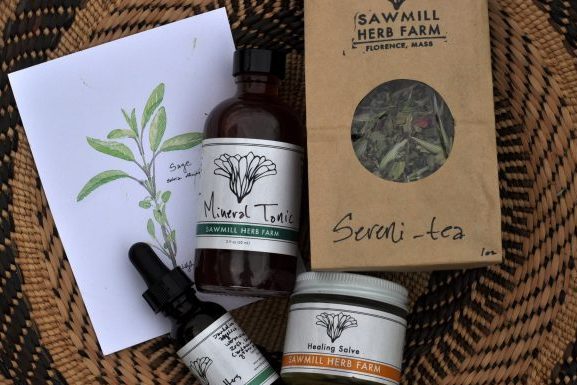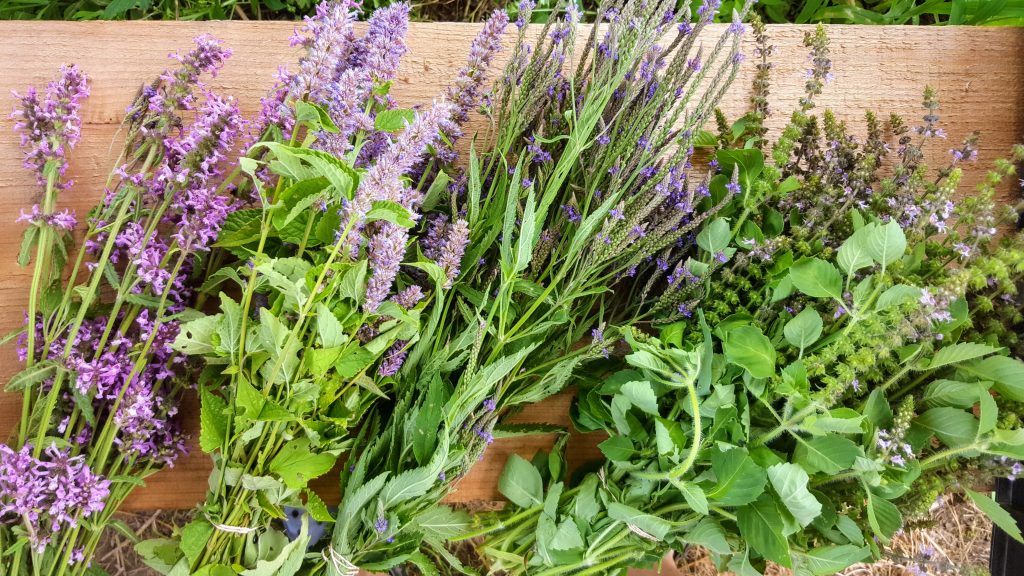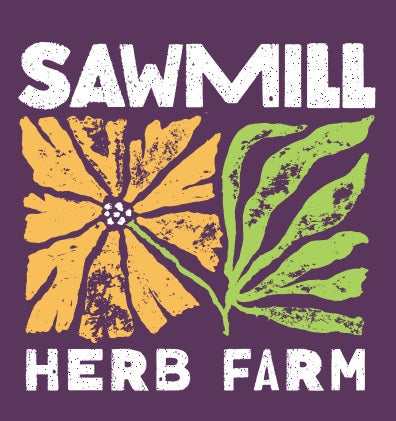Herb Profile: Peppermint
Peppermint, Mentha piperita, Lamiaceae

Peppermint is traditionally used as a remedy for fever, chills, flu and indigestion. Menthol is antispasmodic and an analgesic which helps to settle the stomach and open the sweat pores and peripheral circulation through relaxation. A combination of yarrow, elder and peppermint are excellent for colds, fevers and flu, particularly those conditions brought on by sudden exposure to cold.
The secondary warming/stimulating effects of peppermint can be seen traveling through the lymphatic system of the body where it reaches deep and then travels to the periphery of the body (where we see its effects on fever, flu and stomachache). Peppermint increases the flow of water through the lymphatic organs and has a cooling, moistening effect on hot, dry conditions in the interior and periphery of the body. Peppermint oil has a restorative, regenerative influence on the immune system by stimulating the spleen, improving the breakdown of old red blood cells and increasing white cell production.
Preparations
Infuse dried or fresh leaves, 1/4 – 1/2 teaspoon per cup. Serve hot, warm or cold. Tincture the fresh plant in 100% alcohol or glycerin or the dried plant in 75% alcohol: 25% water.
Everyday Immune Tonic (adapted from The Essential Herbal for Everyday Health by Holly Bellebuono)
The four herbs in this recipe combine well to create immune-boosting infusions, syrups or tinctures. Make an infusion in a 1 quart jar by combining 2 tablespoons dried red clover, 2 tablespoons dried peppermint, 2 tablespoons dried elderberries and 1/4 teaspoons powdered ginger. Drink 1 to 3 cups daily.
Everyday Tonic for Vitality and Vigor (adapted from The Essential Herbal for Everyday Health by Holly Bellebuono)
The herbs in this tonic are super nutritious and can be taken as a tea, syrup or tincture, using the same herbs in the same proportions. Infusions are great for long-term tonics. Make an infusion with 2 tablespoons dried spearmint or peppermint, 2 tablespoons dried nettle and 2 tablespoons dried dandelion root and/or leaves. Drink 1 to 3 cups daily. The dandelion root and leaves can be prepared separately by making a decoction with the root (heating the roots in water over flame) and an infusion with the leaves.
Rosemary’s Blessing First Aid Ointment (adapted from The Essential Herbal for Everyday Health by Holly Bellebuono)
This ointment is an excellent first-aid treatment for external wounds and injuries. Use liberally on cuts, scrapes, burns, bites, stings, itchy skin, ringworm and eczema. Use fresh but lightly wilted herbs. Do not use on deep cuts, as comfrey will heal the surface tissues first while the deeper layers of tissue may harbor infectious bacteria.
Step 1: Make an oil infusion with the following herbs: 2 T yarrow, 2 T comfrey, 2 T elder leaves, 2 T red clover blossoms, 2 T plantain leaves, 1 T peppermint leaves, 1 T calendula petals and 1 t hemlock tips (and/or cedar or juniper tips). Chop all the herbs thoroughly and place in a clean glass jar. Pack the jar tightly and nearly full if you’re using fresh herbs. Pour 2 cups of oil into the jar and use a knife or spoon to poke around the sides to release air bubbles (which can cause spoilage). Make sure the herbs are covered (or mold can form), clean the rim and cap the jar tightly. Place the jar in a cool, dark place and shake daily for two to four weeks. Strain the liquid, and press the herbs firmly to get all the liquid out. Bottle the oil, label and store in a cool, dark place. The oil will last six to twelve months.
Step 2: Make the salve. Take your bottled oil, pour it into a saucepan. Chop or shave 1/2 cup beeswax into the saucepan and heat gently. As the wax melts, you can add 15 drops rosemary essential oil and 15 drops clove essential oil if desired. Once the wax is completely melted, pour the solution into a glass or ceramic container. Cap the containers tightly and allow the salve to cool. Don’t move the containers for an hour as they cool. The salve should last for 1.5 – 2 years.
Heart-Strengthening Tonic (adapted from The Essential Herbal for Everyday Health by Holly Bellebuono)
This is a nerve-soothing tea to strengthen the muscle action of the heart. It can be very warming and is good in situation where the heart (and/or emotions) feels stagnant, cold or “stuck.”
Cautions/Contraindications
Not to be used for bowel complaints with inflammation – pain on pressure, tongue dry, with reddened tip and edges (Matthew Wood). The tea and tincture are safe for general use but overindulgence can cause stomach aches.
🌿 Grow, Harvest & Learn with Us This Season! 🌿
Whether you're looking to fill your apothecary with vibrant, fresh herbs, start your own garden with strong, healthy seedlings, or deepen your knowledge of herbal medicine, we've got you covered.
Join our Fresh Herb CSA to receive weekly bundles of medicinal and culinary herbs, plus guidance on how to use them. Pre-order seedlings to get a head start on your herb garden with our carefully grown plants. Explore our herbal education programs to learn hands-on medicine-making, plant connection, and more.
Looking for high-quality, certified organic herbs year-round? We also offer dried herbs and small-batch tea blends, thoughtfully grown and harvested to bring you the best in herbal wellness.
Be part of a community that values resilience, self-sufficiency, and deep connection to the land. 💚
Sign up for the CSA, pre-order seedlings, shop our dried herbs and tea blends, or explore our herbal education offerings today!
Disclaimer
These statements have not been evaluated by the Food and Drug Administration. This product is not intended to diagnose, treat, cure, or prevent any disease. For educational purposes only. We do not endorse the websites linked to in the resources and have not extensively reviewed all the information on external pages for accuracy. Everyone reacts differently to herbs and we do not attempt to be completely inclusive in the information and contraindications for each herb. Trust your intuition if something is not feeling right for you.
Shop our Apothecary and Nursery
-

Apothecary Products
Nourish yourself and your family with a certified organic farm grown apothecary ...
-

Nursery Products
Grow your garden. We grow certified organic herb, flower and vegetable starts. ...


